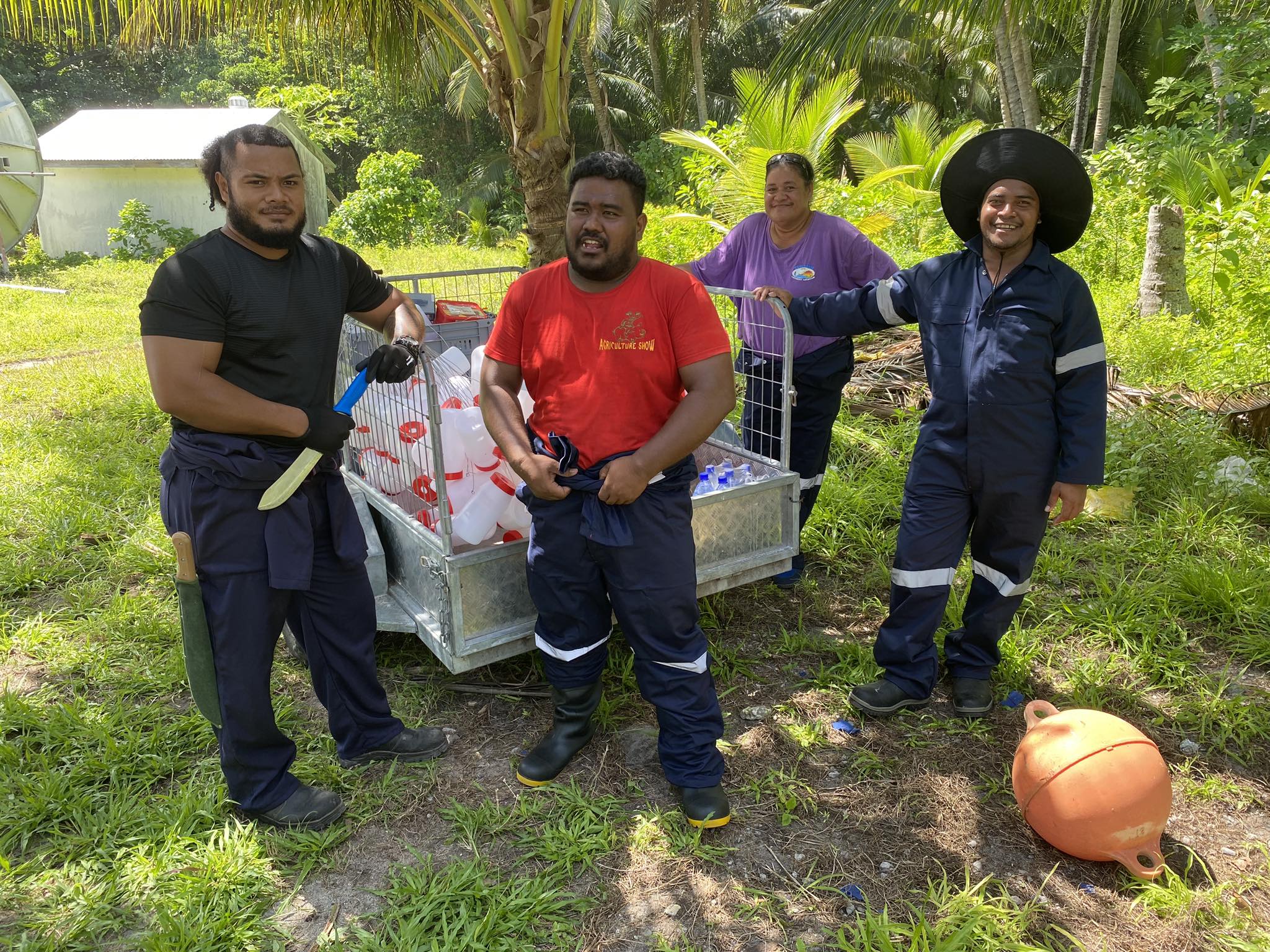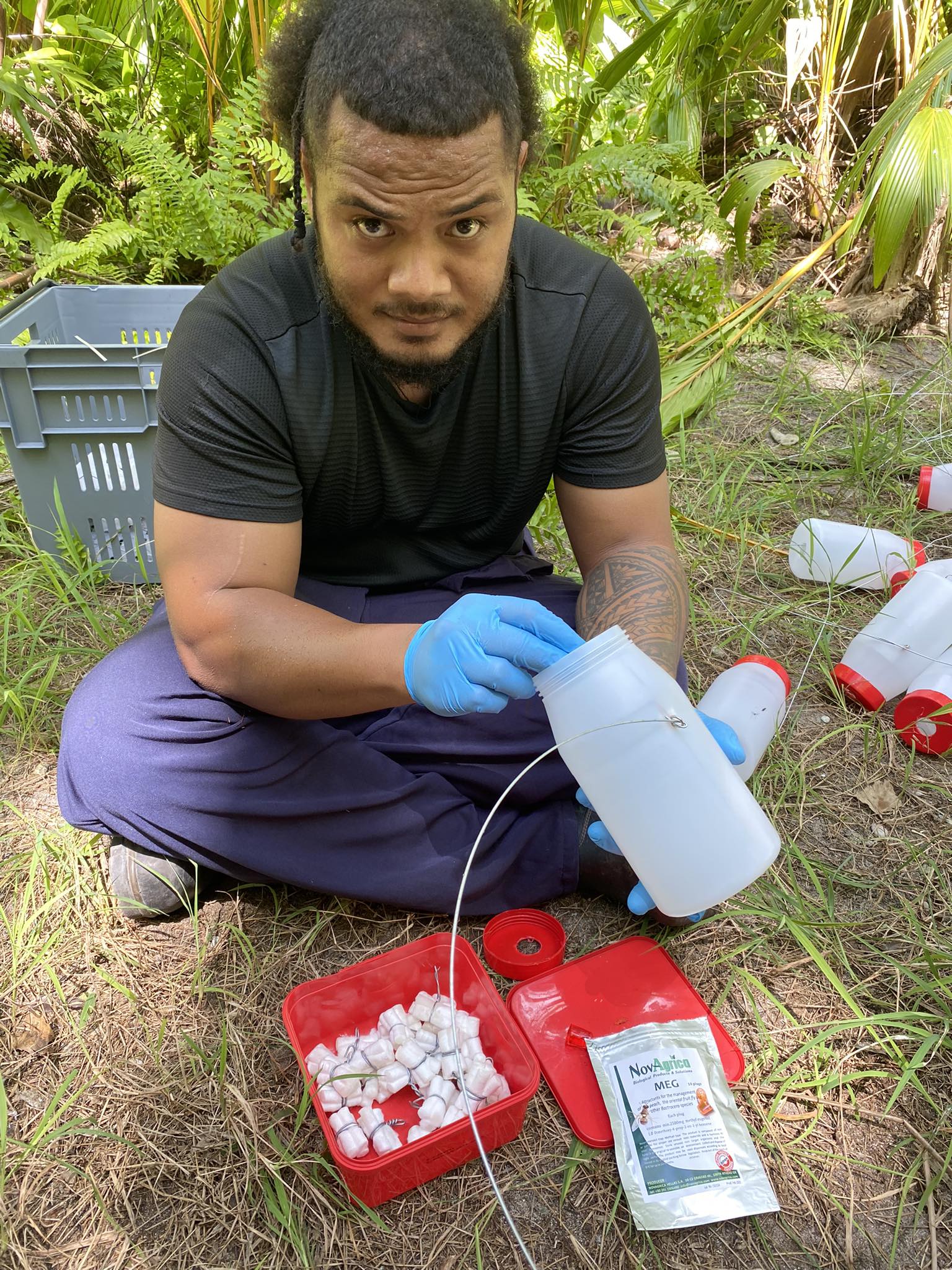(Contenu disponible en anglais uniquement)

The Pacific Community (SPC), with the support of the European Union under the Safe Agricultural Trade Facilitation through Economic Integration in the Pacific (SAFE Pacific) project, is helping strengthen biosecurity in the region to combat pests and diseases and improve access to trade and export markets.
Fruit flies are a significant agricultural pest that can cause extensive damage to fruit and vegetable crops, impacting trade and the capacity to engage in food commerce. With its lush tropical and subtropical environments, the Pacific region is not immune to this menace.
A fruit fly outbreak in Tuvalu, one of the smallest Pacific nations, has a major impact on livelihoods, domestic trade, and the economy. Upon a recent request from the Tuvalu Government to curb the fruit fly problem on Niulakita island, SPC immediately launched a collaboration with the Tuvalu Department of Agriculture (DOA) to implement an effective biosecurity strategy to monitor and suppress the Niulakita fruit fly population.
This fruit fly species is found only in Niulakita, leading the Department of Agriculture (DOA) to limit the transporting of fruits and vegetables to other islands. This restriction has negatively impacted local communities, resulting in an inability to trade these products from the island, consequently leading to economic losses and food security concerns.
Recognising the harm that fruit flies could cause Tuvalu's agricultural sector if they spread from Niulakita, the Tuvaluan Government requested assistance from SPC to manage the issue. SPC collaborated with DOA to implement a multi-pronged approach with the key aim first to suppress the population on Niulakita and then target total elimination of the pest over the long term.
The SPC Land Resources Division (LRD) Biosecurity and Plant Health teams conducted intensive one-week hands-on practical exercises with the Tuvalu DOA officers through the EU-funded SAFE Pacific project. They helped prepare the materials required for the suppression programme.
SPC trained the biosecurity officers on marking trapping grids using GPS devices, assembling and installing various fruit fly traps, trap servicing and sample collection, morphologically distinguishing different types of fruit flies and packaging samples for identification or authentication of an ID. The officers had the knowledge and skills to combat the threat fruit flies posed to the nation's agriculture sector.
 The upskilling of DOA staff was put into action when they promptly assembled and deployed a team to implement the learnings on Niulakita as a large-scale biosecurity intervention strategy. Based on pre-marked sites in a 100 m x 100 m grid, the team installed methyl-eugenol (ME), CUE-lure (CUE) and trimmed-lure (TRI) fruit fly traps at 51 sites, four additional than was initially planned. The team also prepared and installed protein-bait fruit fly traps. The DOA team used a combination of surveillance and safety equipment supplied by SPC. It innovatively utilised locally available resources for the mission, displaying its dedication and ability to concoct solutions based on teachings by the SPC team. The data collected from each site over 2-4 weeks will help plan continuing activities on the island.
The upskilling of DOA staff was put into action when they promptly assembled and deployed a team to implement the learnings on Niulakita as a large-scale biosecurity intervention strategy. Based on pre-marked sites in a 100 m x 100 m grid, the team installed methyl-eugenol (ME), CUE-lure (CUE) and trimmed-lure (TRI) fruit fly traps at 51 sites, four additional than was initially planned. The team also prepared and installed protein-bait fruit fly traps. The DOA team used a combination of surveillance and safety equipment supplied by SPC. It innovatively utilised locally available resources for the mission, displaying its dedication and ability to concoct solutions based on teachings by the SPC team. The data collected from each site over 2-4 weeks will help plan continuing activities on the island.
Installing fruit fly traps and implementing comprehensive biosecurity measures, including community awareness and involvement in cultural controls (such as field sanitation, fruit collection and burial/burning), are expected to positively impact Tuvalu in the long run. Niulakita island restrictions can be lifted with a reduced risk of fruit fly infestations. The island could also explore opportunities to trade agricultural commodities with other atolls.
The partnership involving the Tuvalu DOA and SPC, supported by the EU SAFE Pacific project, has proved crucial for the county's agriculture trade. The training and ingraining pest surveillance know-how have played a pivotal role in equipping biosecurity officers with essential skills and fostering a sense of ownership in their mission to safeguard Tuvalu from current and future threats.
About this project:
The Safe Agriculture Trade Facilitation through Economic Integration in the Pacific (SAFE Pacific) project is funded by the European Union and implemented by The Pacific Community to support greater regional economic integration. The SAFE Pacific project aims to improve the economic and social benefits for Pacific countries arising from stronger regional economic integration. SAFE Pacific is implemented across 15 Pacific countries, including Cook Islands, Fiji, Federated States of Micronesia, Kiribati, Nauru, Niue, Palau, PNG, Republic of Marshall Islands, Samoa, Solomon Islands, Timor-Leste, Tonga, Tuvalu and Vanuatu.
For media inquiries, please contact:
- SPC's Land Resources Division (LRD) Communications Officer- SAFE Pacific Maryann Lockington - [email protected]
- SPC's Land Resources Division (LRD) Integrated Programme Coordinator (Biosecurity, Sanitary and Phytosanitary Standards) - Dr Visoni Timote [email protected]
- SPC's Land Resources Division (LRD) Biosecurity Officer Riten Gosai [email protected]